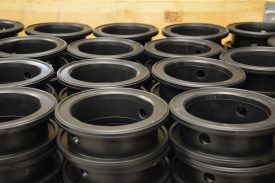Different types of rubber

As experts in our trade, we know all about the various types and qualities of rubber. There are many types of rubber (polymer grades) and each material has its own characteristics.
The choice of material depends on the application of the product and the ambient factors. Based on their experience and expertise, our rubber technologists will help you to determine which type of rubber is best suited for a particular application. RIS manufactures a wide range of rubber products and so we regularly work with the many different types of rubber.
In total there are around 40 types of natural and synthetic rubber, and the most commonly used are described below.
NR rubber
- NR stands for Natural Rubber
- Extremely strong, soft, hardwearing and elastic
- Applied in the tyre industry, for oscillation dampers and all kinds of mould components
- Read more about natural rubber here.
IR rubber
- IR (Isoprene Rubber) is synthetic natural rubber
- High tensile strength and excellent adhesion to metal
- Mainly used in products for which it is hard to process natural rubber.
SBR rubber
- SBR stands for styrene-butadiene rubber, the rubber most commonly-produced worldwide
- Resistant to water and glycol and very hardwearing
- Applied in construction, the shipping industry, industry at large and coach building
- Read more about SBR here.
EPDM rubber
- EPDM (Ethylene Propylene Diene Monomer)
- Highly resistant to ozone, UV radiation, ageing and acids
- Meets the highest requirements in the water and food industries
- Frequently used in the building industry and automotive sector
- Read more about EPDM rubber here.
NBR rubber
- NBR stands for Nitrile Butadiene Rubber, often just called Nitrile rubber.
- Highly resistant to oil, fuels and grease
- Much used in workshops, garages and on oil platforms
- Read more about NBR here.
FKM rubber
- Viton is the best-known trade name for FKM or fluoride rubber; the brand name has been registered by DuPont
- Resistant to many chemicals as well as concentrated acids and lyes
- Temperature stable up to 250 °C
- Wide range of applications in the chemical and petrochemical industries
- Read more about FKM rubber here.
FFKM rubber
- Can withstand extremely high temperatures, even up to 327 °C
- Used for cable sleeves, gaskets and O-rings in chemical processing equipment.
Butyl rubber
- Also known as IIR rubber
- Suitable for inner tubes and other high-pressure tyres due to its low gas permeability and flexibility
- Applied in the chemical industry, where high concentrations of mineral acids and lyes prevail.
CR rubber
- Chloroprene rubber, also known by the brand name Neoprene
- Can withstand heat, ozone and adverse weather conditions
- Excellent sea water resistance
- Frequently used in the shipping industry
CSM rubber
- Chlorosulphonated Polyethylene; Hypalon is the name most commonly used for CSM rubber
- Can withstand external weather conditions including UV radiation and ozone
- Applied in the building and electro-technical industries
- Also used in the chemical and automotive industries.
Linatex rubber
- Consists of 95% natural rubber
- Extremely hardwearing
- Applied in mining and building as well as in the gravel and sand industries.
During the development stages of a product and taking account of the application and ambient factors, our rubber technologist will determine the most suitable type of rubber for a product. On the basis of that rubber grade, our R&D department set about the business of creating a design for the rubber product. FEM software is often deployed during this design stage to check the design prior to the production of a mould. The calculations of our FEM suite are highly accurate thanks to many years of data input into the software; this makes it possible for us to achieve an appropriate design quickly and at low cost. When the design stage is complete, we produce a mould and samples, which are then tested in-house. Once all requirements have been met and the customer is satisfied, production is authorised and started.
If you would like to know more about the grades of rubber and their properties, please feel free to contact us. We would be delighted to discuss the possibilities with you.

